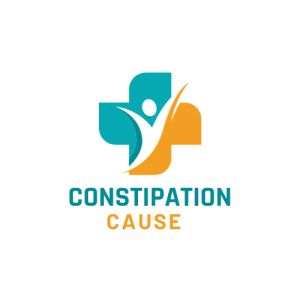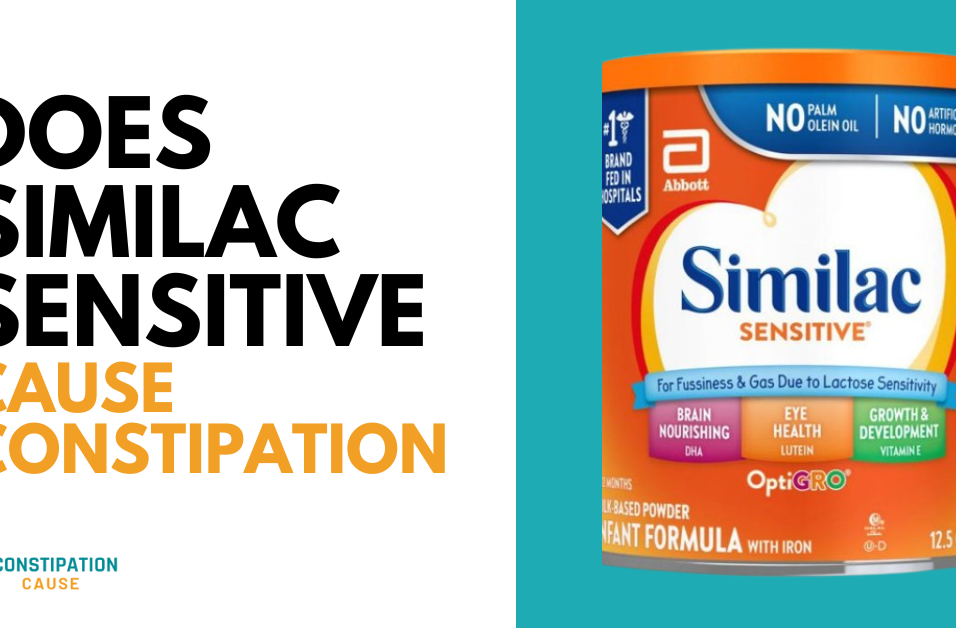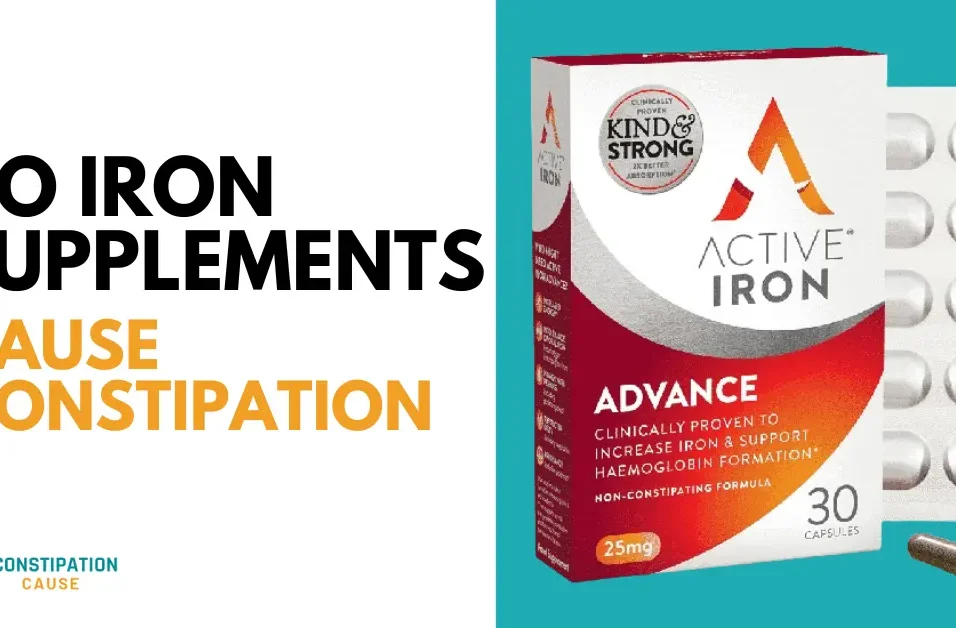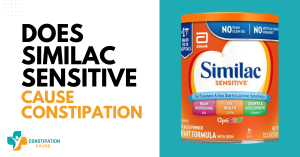When it comes to infant formula, Nutramigen is a name that often surfaces in conversations. This specialized formula, created by experts in pediatric nutrition, is designed to address specific feeding concerns, making it a go-to choice for many parents. However, like any nutritional product, Nutramigen is not without its share of questions and concerns.
Are you or your little one dealing with the discomfort of constipation? It’s a common issue that can leave you searching for answers, especially if you’ve recently made a switch to Nutramigen. But fear not!
In this article, we’re delving deep into the world of Nutramigen to uncover the truth: Does Nutramigen cause constipation, or are there other factors at play? Get ready to navigate the ins and outs of this topic and find solutions to keep your little one comfortable and content. Let’s get started!
Nutramigen Formula: What is it?
Nutramigen is a specialized infant formula developed by experts in pediatric nutrition to address specific feeding concerns in infants and young children. It stands out as a hypoallergenic formula designed to meet the unique dietary needs of infants who experience adverse reactions to traditional cow’s milk-based or soy-based formulas.
Usage of Nutramigen:
- Hypoallergenic Formula: Nutramigen is primarily used when infants exhibit symptoms of cow’s milk protein allergy (CMPA) or soy allergy. CMPA can lead to various discomforting symptoms like colic, eczema, diarrhea, and yes, constipation.
Ingredients in Nutramigen:
- Hydrolyzed Proteins: Nutramigen contains extensively hydrolyzed proteins, which are proteins that have been broken down into smaller, more manageable fragments. This makes it easier for infants to digest and reduces the likelihood of triggering allergic reactions.
- Lactose-Free: Nutramigen is also lactose-free, making it suitable for infants with lactose intolerance or those experiencing gastrointestinal discomfort related to lactose consumption.
Common Reasons for Using Nutramigen:
- Cow’s Milk Protein Allergy (CMPA): Infants with CMPA may experience allergic reactions to proteins found in cow’s milk-based formulas. Nutramigen’s hydrolyzed proteins are less likely to trigger allergic responses, making it an effective alternative.
- Soy Allergy: Some infants may also exhibit allergies to soy-based formulas. Nutramigen offers a soy-free option, which can be crucial for those with soy allergies.
- Gastrointestinal Issues: Nutramigen may be recommended for infants who experience gastrointestinal discomfort, including colic, diarrhea, or constipation, as it is formulated to be gentle on sensitive digestive systems.
- Eczema and Skin Issues: CMPA can manifest as skin issues like eczema. Nutramigen’s hypoallergenic properties may help alleviate these skin conditions in some infants.
Understanding Constipation in Infants
Constipation is a common concern among infants, and it’s important to recognize its causes and symptoms to ensure the well-being of your little one. Here, we’ll explore what constipation is, its telltale signs, factors that can lead to it in infants, and why addressing constipation is crucial for your baby’s comfort and health.
What is Constipation?
Constipation refers to the difficulty or infrequency of passing stool. In infants, it’s characterized by:
- Infrequent bowel movements (typically less than three times a week)
- Straining or discomfort during bowel movements
- Passing hard or dry stool
Factors Leading to Constipation in Infants:
- Dietary Factors: Introducing solid foods, transitioning from breast milk to formula, or specific formula choices can influence an infant’s bowel movements. Some infants may be more sensitive to certain food components, leading to constipation.
- Dehydration: Insufficient fluid intake can result in dry and hard stool, making it difficult to pass.
- Formula Choice: Some infants may experience constipation as a reaction to the composition of the formula they consume.
- Introduction of Solid Foods: The introduction of solid foods can change the consistency of a baby’s stool, and some foods may contribute to constipation.
- Medical Conditions: Rarely, underlying medical conditions can lead to chronic constipation in infants. Conditions such as hypothyroidism or anatomical abnormalities may be contributing factors.
Importance of Addressing Constipation in Infants:
Addressing constipation is crucial for several reasons:
- Comfort: Constipation can be uncomfortable and distressing for infants, causing discomfort and irritability.
- Nutrition and Growth: Persistent constipation can impact a baby’s appetite and nutritional intake, potentially affecting their growth and development.
- Establishing Healthy Bowel Habits: Addressing constipation early helps establish healthy bowel habits and prevents long-term issues.
- Parent-Child Bond: Addressing your baby’s discomfort fosters trust and strengthens the parent-child bond.
In the context of using Nutramigen or any infant formula, understanding constipation is essential to ensure your baby’s digestive health. If you suspect constipation, it’s advisable to consult your healthcare provider for guidance on addressing the issue and, if necessary, making adjustments to your baby’s diet or formula to provide relief.
Now, let’s hop onto reveal whether Nutramigen formula and constipation are related.
Nutramigen and Infant Constipation: Is There a Connection?
When it comes to infant nutrition, parents strive to make the best choices for their little ones. Nutramigen, a hypoallergenic infant formula, is often recommended for babies with specific dietary concerns.
However, some parents have reported cases of constipation in babies using Nutramigen, leading to questions about a potential connection.
Reported Cases of Nutramigen and Constipation:
Anecdotal reports from parents and caregivers have indicated instances where infants using Nutramigen experienced constipation. These accounts often describe the following:
- Increased difficulty passing stool
- Changes in stool consistency (hard or dry stool)
- Discomfort or irritability in the infant
While these reports are valuable in highlighting potential concerns, it’s essential to remember that they represent individual experiences and do not establish a definitive causal link between Nutramigen and constipation. Several factors can contribute to constipation in infants, making it challenging to attribute the issue solely to the formula.
Studies and Research:
As of the knowledge cutoff date in September 2021, there is limited published research specifically investigating the direct link between Nutramigen and constipation in infants. Most clinical studies and research on Nutramigen have primarily focused on its efficacy in managing conditions such as cow’s milk protein allergy (CMPA) and its role as a hypoallergenic formula.
In some of these studies, gastrointestinal symptoms, including constipation, have been mentioned as potential symptoms associated with CMPA. However, it’s important to note that CMPA can present with a range of gastrointestinal issues, and constipation may be one of several symptoms. These studies often involve infants with multiple gastrointestinal symptoms, making it challenging to isolate the specific contribution of Nutramigen to constipation.
Expert Opinions and Medical Insights:
Medical experts and pediatricians acknowledge that constipation can occur in infants for various reasons. While Nutramigen is designed to be a hypoallergenic formula with extensively hydrolyzed proteins to reduce allergenic potential, it may not be entirely exempt from causing constipation, especially if an infant is sensitive to specific components within the formula.
Expert opinions emphasize the importance of individualized care when selecting an infant formula. Infants have varying dietary needs and sensitivities, and the formula choice should be based on a thorough assessment of these factors. If constipation occurs while using Nutramigen, healthcare providers can play a crucial role in evaluating the situation, exploring potential causes, and recommending appropriate dietary adjustments or formula changes to alleviate the issue.
In conclusion, the potential connection between Nutramigen and constipation in infants remains a topic of interest and concern. While there are reported cases of constipation associated with Nutramigen, scientific research has not definitively established a causal relationship. It is essential for parents to maintain open communication with healthcare providers, monitor their infants’ well-being, and seek expert guidance to ensure the best possible nutritional choices and comfort for their little ones.
Factors Influencing Constipation in Infants
Constipation in infants can be influenced by various factors beyond the choice of infant formula. In this section, we’ll explore these additional factors, including dietary habits, lifestyle choices, and potential causes beyond formula selection, to provide a comprehensive understanding of what may contribute to infant constipation.
1. Dietary Habits:
- Introduction of Solid Foods: The transition from a liquid diet (breast milk or formula) to solid foods can sometimes lead to changes in stool consistency and frequency. Some solid foods, such as rice cereal, may be more constipating for certain infants.
- Fiber Intake: Infants who are not yet consuming a balanced diet may have insufficient fiber intake. Adequate fiber is essential for promoting regular bowel movements.
2. Hydration:
- Insufficient Fluid Intake: Infants who do not consume enough fluids, particularly water, may experience constipation. Breastfed infants typically receive the necessary hydration from breast milk. However, formula-fed infants may require additional water, especially in hot weather.
3. Lifestyle Choices:
- Physical Activity: Lack of physical activity, which is typical in very young infants, can contribute to constipation. Encouraging gentle movements and tummy time may help.
- Sedentary Behavior: Extended periods of immobility, such as excessive time spent in car seats or baby swings, can potentially affect bowel movements.
4. Medical Conditions and Medications:
- Underlying Medical Conditions: Certain medical conditions, such as hypothyroidism or Hirschsprung’s disease, can lead to chronic constipation in infants. These conditions may require medical evaluation and treatment.
- Medications: Some medications prescribed for other health issues may have constipation as a side effect in infants. If your infant is taking medication, discuss potential side effects with the healthcare provider.
5. Toilet Training and Emotional Factors:
- Toilet Training: Attempts at toilet training before a child is developmentally ready can cause anxiety and withholding of stool, leading to constipation.
- Emotional Factors: Emotional stress or changes in the child’s routine, such as starting daycare or experiencing family disruptions, can sometimes affect bowel habits.
6. Cow’s Milk Protein Allergy (CMPA):
- Cow’s Milk Protein Allergy: Beyond formula choices, infants with CMPA may experience various gastrointestinal symptoms, including constipation. This condition may necessitate specialized formulas or dietary changes.
How Nutramigen Affects the Digestive System:
Nutramigen is designed to be a hypoallergenic formula, primarily used to manage conditions such as cow’s milk protein allergy (CMPA) and other feeding concerns in infants. Its effects on the digestive system include:
- Reduced Allergenic Potential: Nutramigen contains extensively hydrolyzed proteins, which are broken down into smaller, more manageable fragments. This reduces the likelihood of triggering allergic reactions in infants with sensitivities to cow’s milk proteins.
- Lactose-Free: Nutramigen is lactose-free, making it suitable for infants with lactose intolerance or those experiencing gastrointestinal discomfort related to lactose consumption.
Possible Reasons for Digestive Discomfort:
While Nutramigen is formulated to be gentle on the digestive system, digestive discomfort can still occur in some infants for various reasons:
- Adjustment Period: When transitioning from one formula or breast milk to Nutramigen, some infants may experience an adjustment period during which their digestive system adapts to the new formula. This can lead to temporary digestive discomfort.
- Sensitivity to Specific Ingredients: Although Nutramigen is hypoallergenic, some infants may still be sensitive to certain components within the formula. Sensitivities can vary from one infant to another, potentially leading to digestive symptoms.
- Gastrointestinal Conditions: Infants with pre-existing gastrointestinal conditions or underlying medical issues may experience digestive discomfort, and these conditions may require specific medical evaluation and management.
Balancing Benefits and Potential Side Effects:
Balancing the benefits of Nutramigen with its potential side effects is a crucial consideration for parents and healthcare providers. The benefits of Nutramigen include:
- Management of CMPA: Nutramigen is an effective choice for infants with cow’s milk protein allergy, providing relief from symptoms such as colic, eczema, diarrhea, and vomiting.
- Lactose Intolerance: It offers a lactose-free option for infants with lactose intolerance or gastrointestinal discomfort related to lactose consumption.
However, it’s important to acknowledge that no single infant formula is universally suitable for all infants. Individual factors, including a baby’s specific dietary needs and sensitivities, should be taken into account when selecting a formula.
In cases where digestive discomfort arises while using Nutramigen, consulting with a healthcare provider is recommended. Healthcare professionals can evaluate the situation, consider potential underlying causes, and make appropriate adjustments to ensure optimal digestive health for the infant.
Managing Constipation in Infants
Constipation in infants can be distressing for both parents and babies. In this section, we will discuss effective strategies for preventing and alleviating constipation, including dietary modifications, maintaining adequate fluid intake, and knowing when it’s essential to consult a pediatrician for professional guidance.
Strategies for Preventing or Alleviating Constipation:
- Dietary Modifications:
- Increase Fiber: Gradually introduce age-appropriate high-fiber foods into your baby’s diet. These may include fruits like pears, prunes, and peaches, as well as vegetables like peas and sweet potatoes.
- Limit Constipating Foods: Be mindful of foods that can contribute to constipation, such as bananas and rice cereal. While these foods are nutritious, their introduction should be gradual.
- Balanced Diet: Ensure that your baby’s diet is well-balanced with a mix of fruits, vegetables, grains, and proteins.
- Fluid Intake:
- Breastfeeding: If you’re breastfeeding, continue to do so as breast milk provides optimal hydration for infants.
- Formula Feeding: For formula-fed infants, offer water in addition to formula as needed, especially in hot weather. Consult your pediatrician for guidance on water intake.
- Prune Juice: Prune juice is a natural remedy for constipation. It can be diluted with water and offered to infants over six months of age.
- Age-Appropriate Foods:
- Solid Foods: Introduce solid foods at the appropriate age as recommended by your pediatrician. Starting solids too early can lead to digestive issues, including constipation.
- Tummy Time:
- Encourage tummy time for your baby, as it can help stimulate bowel movements and strengthen abdominal muscles.
- Warm Baths:
- A warm bath can be soothing and may help relax your baby’s abdominal muscles, potentially easing constipation discomfort.
- Gentle Abdominal Massage:
- Perform gentle circular massages on your baby’s abdomen to help stimulate bowel movements.
- Monitor Bowel Movements:
- Keep track of your baby’s bowel movements and share this information with your pediatrician if constipation persists.
When to Consult a Pediatrician:
While mild constipation is common and often manageable with the above strategies, it’s crucial to know when to seek professional guidance:
- If constipation persists or worsens despite dietary adjustments and home remedies.
- If your baby is experiencing severe pain, discomfort, or distress related to constipation.
- If there is blood in the stool or other concerning symptoms.
- If your baby is not gaining weight or seems to be in distress.
Your pediatrician can provide a thorough evaluation, rule out any underlying medical conditions, and offer appropriate treatment or further guidance. In some cases, they may recommend specific infant formulas or medications to alleviate constipation safely.
Alternative Formula Options
While Nutramigen is a popular hypoallergenic infant formula, it’s essential to explore other hypoallergenic formula choices. In this section, we will discuss various alternatives, weigh the pros and cons of different formulas, and guide parents in finding the best option for their baby’s specific dietary needs.
Exploring Hypoallergenic Formula Choices:
- EleCare:
- Pros: EleCare is another extensively hydrolyzed formula suitable for infants with cow’s milk protein allergy (CMPA) and multiple food allergies. It is available in various forms, including ready-to-feed, powder, and concentrate.
- Cons: It can be more expensive than standard infant formulas.
- Alimentum:
- Pros: Alimentum, produced by Similac, is an extensively hydrolyzed formula known for its efficacy in managing CMPA symptoms. It’s available in a range of forms.
- Cons: Like other specialized formulas, Alimentum can be more costly than regular infant formulas.
- Neocate:
- Pros: Neocate is an amino acid-based formula designed for infants with severe food allergies, malabsorption disorders, or gastrointestinal conditions. It is hypoallergenic and well-tolerated.
- Cons: It is one of the more expensive options, and its taste may not be as palatable to some infants.
- PurAmino:
- Pros: PurAmino, produced by Enfamil, is an amino acid-based formula for infants with severe food allergies and other digestive concerns. It provides essential nutrients while being hypoallergenic.
- Cons: It can be costly compared to regular infant formulas.
Weighing the Pros and Cons:
- Pros of Specialized Formulas:
- Effectiveness in Managing Allergies: Specialized formulas are designed to manage severe allergies and sensitivities effectively.
- Reduced Allergenic Potential: Extensively hydrolyzed and amino acid-based formulas have a reduced allergenic potential.
- Healthcare Provider Guidance: These formulas are typically recommended and supervised by healthcare providers, ensuring tailored care.
- Cons of Specialized Formulas:
- Cost: Hypoallergenic and amino acid-based formulas tend to be more expensive than standard infant formulas.
- Taste Preferences: Some infants may find the taste of specialized formulas less appealing.
Finding the Best Option for Your Baby:
The choice of the best hypoallergenic formula for your baby depends on their specific dietary needs and any underlying health conditions. It’s crucial to work closely with your pediatrician or a pediatric gastroenterologist to:
- Determine the underlying cause of your baby’s feeding concerns and allergies.
- Explore and consider different formula options.
- Monitor your baby’s response to the chosen formula and make adjustments as needed.
Remember that every baby is unique, and what works best for one may not be suitable for another. Finding the right formula involves a combination of medical advice, careful monitoring, and consideration of your baby’s preferences. The ultimate goal is to provide your baby with the most appropriate formula that ensures their comfort, growth, and overall well-being.
Nutramigen Alternatives: Homemade Hypoallergenic Recipes
For parents seeking alternative hypoallergenic options beyond commercially available formulas like Nutramigen, homemade hypoallergenic formulas may pique interest. In this section, we will provide information on making homemade hypoallergenic formulas, emphasize safety and effectiveness considerations, and underscore the importance of consulting with a healthcare provider before exploring this option.
Making Homemade Hypoallergenic Formulas:
Homemade hypoallergenic formulas are typically based on simple recipes that aim to provide essential nutrients to infants with specific dietary concerns. These recipes may involve easily digestible ingredients that are less likely to trigger allergies or sensitivities. However, it’s crucial to approach homemade formulas with caution, as infant nutrition is a delicate matter. Here are some considerations:
- Ingredients: Homemade hypoallergenic formulas often include ingredients such as rice milk, olive oil, and essential nutrients like calcium and vitamin D. These recipes may vary, so it’s essential to follow a trusted recipe from a reliable source.
- Recipe Source: Ensure that the recipe you use is from a reputable and trusted source, such as a healthcare provider, registered dietitian, or pediatric specialist. Avoid recipes found on the internet without proper credentials.
- Nutritional Balance: The homemade formula should aim to provide a balance of essential nutrients, including proteins, carbohydrates, fats, vitamins, and minerals, suitable for your baby’s age and dietary needs.
Safety and Effectiveness Considerations:
While homemade hypoallergenic formulas may seem like an appealing alternative, it’s vital to acknowledge potential safety and effectiveness considerations:
- Risk of Allergic Reactions: Homemade formulas may still contain allergenic components, inadvertently leading to allergic reactions or sensitivities in some infants.
- Nutritional Gaps: Homemade formulas may not provide a comprehensive and balanced nutritional profile. Infants have specific nutrient requirements that must be met for healthy growth and development.
- Quality Control: Commercial infant formulas are rigorously tested and regulated to meet strict quality and safety standards. Homemade formulas may lack the same level of quality control.
- Consultation with Healthcare Provider: Before considering a homemade hypoallergenic formula, consult with a healthcare provider, such as a pediatrician or pediatric gastroenterologist. They can assess your baby’s specific dietary needs, allergies, and sensitivities, and provide guidance on the safest and most effective feeding options.
Importance of Consulting with a Healthcare Provider:
The decision to use a homemade hypoallergenic formula should be made in consultation with a healthcare provider who can:
- Evaluate your baby’s unique dietary needs and any allergies or sensitivities.
- Discuss the potential risks and benefits of homemade formulas.
- Offer recommendations on suitable commercial hypoallergenic formulas if needed.
- Monitor your baby’s growth and development to ensure they are receiving adequate nutrition.
Conclusion
In this comprehensive exploration of Nutramigen and its potential role in constipation among infants, we’ve delved into critical aspects that parents and caregivers need to consider. Let’s recap the key points discussed and emphasize the significance of consulting a healthcare professional for personalized guidance:
Recap of Key Points:
- Nutramigen: Nutramigen is a specialized hypoallergenic infant formula designed to address specific feeding concerns, including cow’s milk protein allergy (CMPA) and gastrointestinal discomfort.
- Potential for Constipation: While Nutramigen is generally well-tolerated, some parents have reported cases of constipation in infants using this formula. However, this connection is not definitively established through scientific research.
- Factors Influencing Constipation: Infant constipation can be influenced by various factors beyond formula choice, including dietary habits, lifestyle, and underlying medical conditions.
- Managing Constipation: Effective strategies for managing and preventing constipation in infants include dietary modifications, maintaining adequate fluid intake, and seeking professional guidance when needed.
- Alternative Formula Options: There are several alternative hypoallergenic formula choices available, each with its pros and cons. The choice should be based on your baby’s specific dietary needs and any underlying health conditions.
Importance of Consulting a Healthcare Professional:
The well-being of your infant is of paramount importance. When it comes to addressing feeding concerns, constipation, or choosing the most suitable formula, it’s crucial to collaborate with a healthcare professional. A pediatrician or pediatric gastroenterologist can provide the following:
- Expert Evaluation: A healthcare provider can assess your baby’s symptoms, overall health, and dietary needs to determine the best course of action.
- Personalized Guidance: Every baby is unique, and their nutritional requirements may vary. Healthcare professionals can offer tailored recommendations to meet your baby’s specific needs.
- Monitoring and Adjustment: Your healthcare provider can monitor your baby’s progress and make necessary adjustments to the feeding plan, including formula selection, as your baby grows and develops.
Overall Assessment of Nutramigen’s Role in Constipation:
Nutramigen serves a valuable role as a hypoallergenic formula for infants with specific dietary concerns. While reports of constipation have been associated with its use, scientific research has not definitively established a causal relationship. The key takeaway is that Nutramigen, like any infant formula, should be chosen and administered under the guidance of a healthcare professional who can ensure that it aligns with your baby’s unique dietary and health needs.
I hope this article answered your question: Does Nutramigen cause constipation?
Frequently Asked Questions
Can Nutramigen formula cause constipation in all babies?
No, Nutramigen formula does not cause constipation in all babies.
How soon can constipation occur after starting Nutramigen?
Constipation can occur at different times after starting Nutramigen. Some babies may experience constipation shortly after transitioning to Nutramigen, while others may not develop constipation until they have been using the formula for a longer period.
Are there any long-term risks associated with using Nutramigen?
There are generally no known long-term risks associated with using Nutramigen when it is appropriately indicated and administered under the guidance of a healthcare provider.
Can I mix Nutramigen with breast milk or other formulas?
It is generally not recommended to mix Nutramigen with breast milk or other infant formulas without the guidance of a healthcare provider.
What are the signs that my baby is experiencing constipation?
Signs that your baby may be experiencing constipation include:
– Infrequent bowel movements (fewer than three bowel movements per week).
– Straining or difficulty passing stool.
– Stool consistency that is hard, dry, or pellet-like.
– Fussiness, discomfort, or irritability during bowel movements.
– Changes in appetite or feeding patterns.
If you observe these signs or have concerns about your baby’s bowel movements, consult your pediatrician for an evaluation.
Should I consult a healthcare professional if my baby has constipation while using Nutramigen?
Yes, if your baby experiences constipation while using Nutramigen or any other formula, it is advisable to consult a healthcare professional, such as your pediatrician.









Leave feedback about this